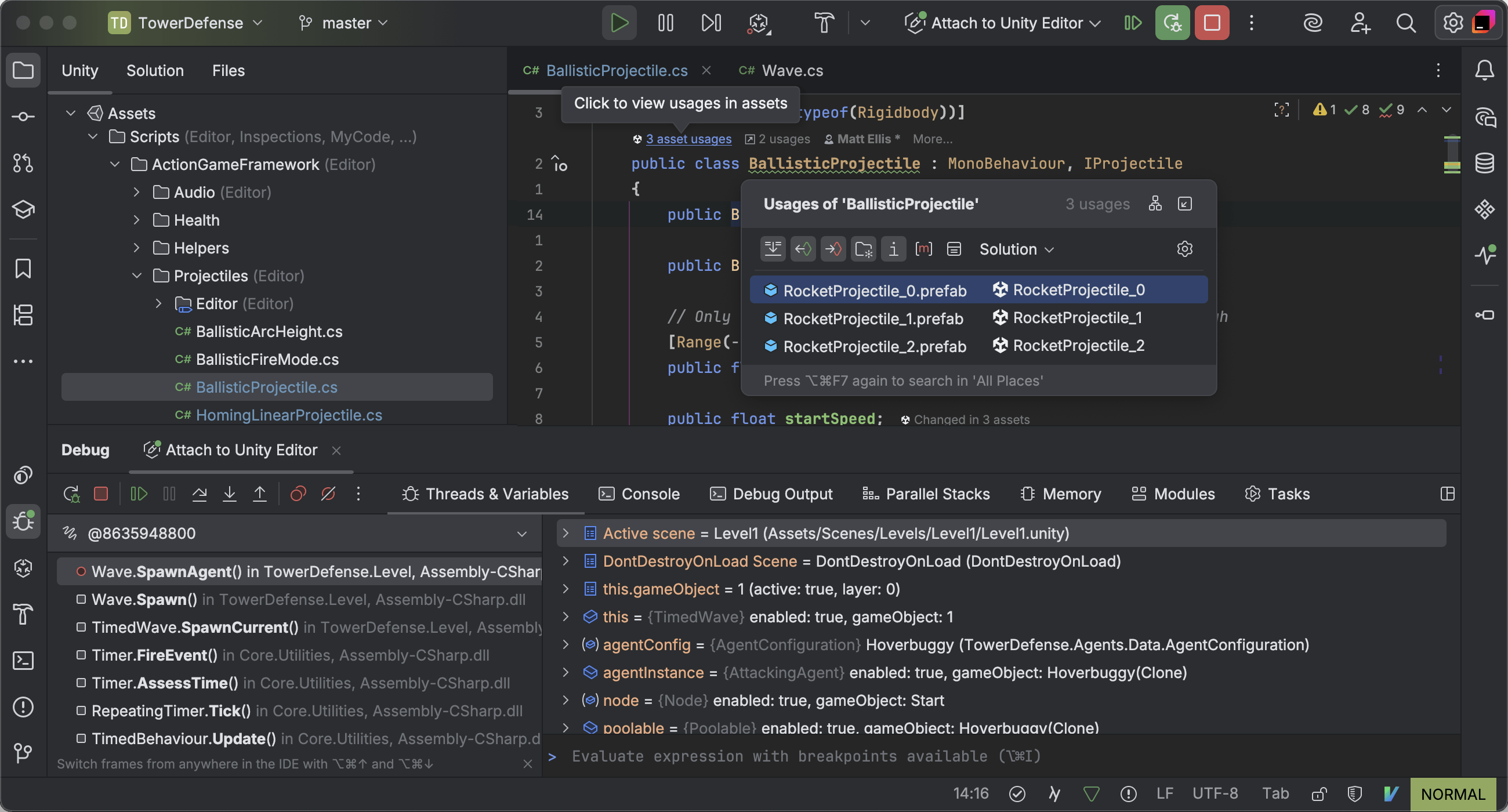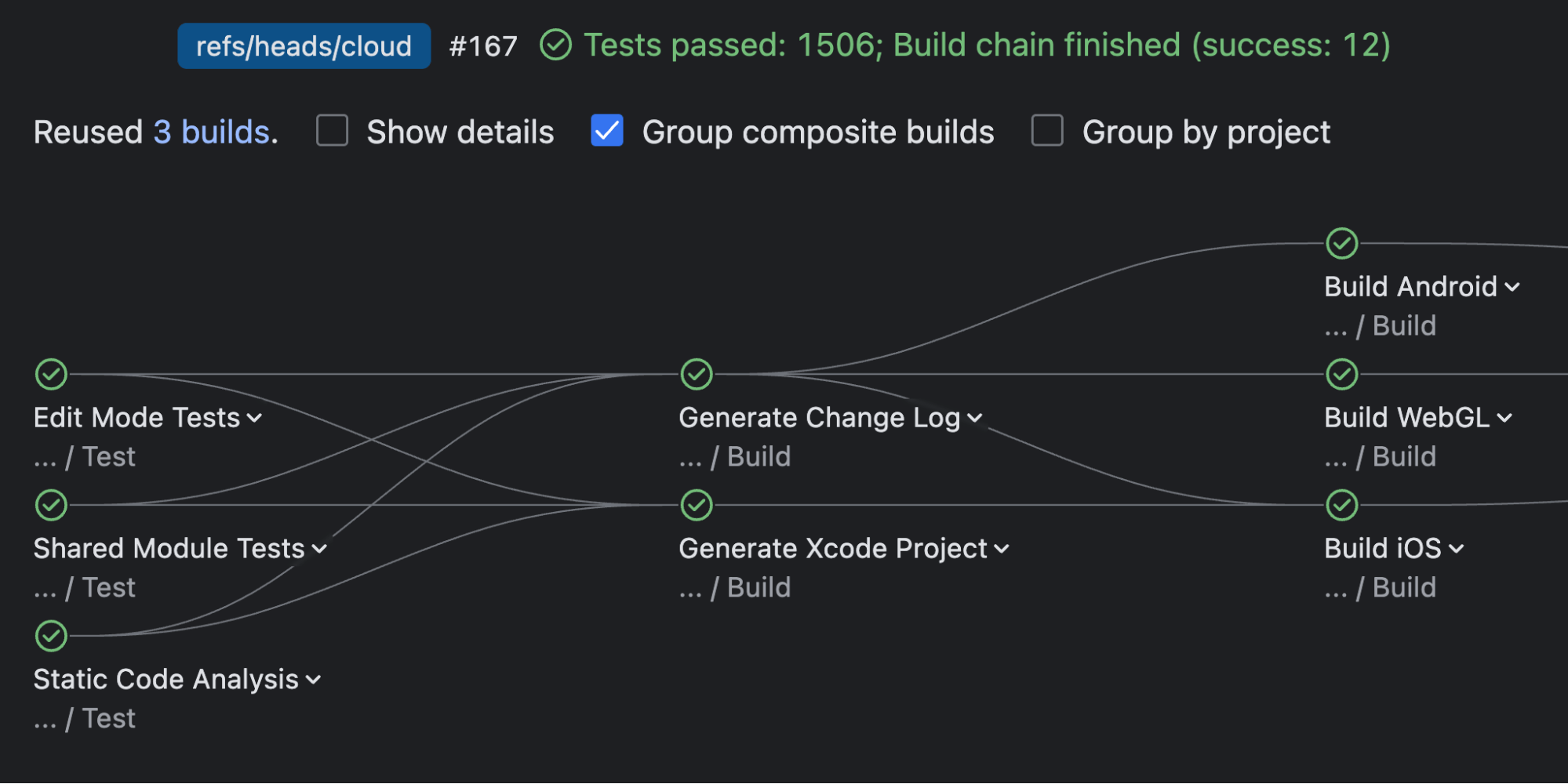Rider for Unity
A smarter way to write C# for Unity
Rider is a fast, fully-featured, and AI-powered code editor for Unity that offers consistent code completion, engine-specific refactorings, and a robust debugging experience across your scripts and assets. Whether you're working on a game or virtual production, Rider has you covered.
Joachim Ante
Co-founder and former CTO of Unity Technologies
"Using Rider to write C# makes me happy. I have never seen code refactoring tools that actually work, without exception. It’s amazing when you can rely on it."
Curious about how Rider solves real-life challenges?
Check out our case studies.

The perfect solution for any scenario
Power up with Rider
Why struggle with sluggish tools, inconsistent code assistance, and endless plugin installations when there's JetBrains Rider? It's the only cross-platform IDE that delivers everything you need for a seamless Unity experience straight out of the box.
Fast
Rider's architecture is designed for speed and responsiveness, even when working on massive projects. All of the resource-intensive code analysis operations are performed in a separate process, so it virtually eliminates interruptions like UI freezes and text input delays.
Reliable
No more drama with broken references to reconnect to the engine – Rider handles .sln, .csproj, and all dependencies behind the scenes, so you always open the right script at the right line.
Engine-tuned
Rider understands the engine inside and out. It recognizes and generates event functions, supports links to official docs, and displays your project structure just like Unity does, so everything feels familiar from the start. No additional setup is required – just install and start developing!
Context-aware AI chat
Not sure why a particular class exists in your Unity project or which library to use for a specific task? Ask AI Assistant via the chat feature. It understands Unity-specific contexts and frameworks, providing answers that account for your project setup and technology stack.
Multiline code completion
AI Assistant generates multiline blocks of code for Unity development. Start typing on a new line, and if a suggestion is available, you’ll see a grayed-out code snippet – like setting up a coroutine or initializing game objects – ready for your approval.
AI-assisted Unity file generation
Need a new MonoBehaviour script or shader? AI Assistant can generate Unity files to your exact specifications while ensuring that your project dependencies are correctly handled, so everything integrates smoothly into your game.
What our customers say
Having the right tool for the job is essential to compete in any market, games especially. At Yakuto, each dev has a JetBrains Toolbox subscription, which we’ve found invaluable for productivity. We work mostly in C# on Macs. This used to mean a VM running ReSharper but with Rider, we’re native to one OS, which is awesome. Unity debugging is now seamless and the extensions add vital Unity-aware context. As a veteran of ReSharper, I feel completely at home in Rider: refactoring, solution-wide analysis, test runners, it’s all there. We couldn’t consider C# development without Rider.
Rider has quickly become the only IDE I want to use; for any UE4 or Unity programming task. It has saved countless hours through its intuitive workflows, and I cannot praise its P4 integration enough. When producers see the speed at which we can go from tasking to resolution, they are enamored with the product. Rider removes all the developer choke points, which prevent us from doing what we do best, code.
Rider is the best and only IDE that we use for Unity programming tasks. It saves a lot of time in our workflow, providing top-notch code analysis for C# with Unity-specific code inspections and quick-fixes. Similarly, Rider warns us if we try to use a new keyword to create a new instance of a class derived from MonoBehavior or ScriptableObject. Seamless debugging also helps a lot. Great tool for us!
Unlock more development power
with dotUltimate
Work your own way, seamlessly switching between Rider and ReSharper at will, and get access to top-tier profilers and coverage tools only available to dotUltimate subscribers.
Accelerate your workflows with AI-powered capabilities integrated into Rider and ReSharper to speed up coding and make it more enjoyable.
Reduce procurement overhead and optimize costs with a single comprehensive license. Prepare your business for growth with dotUltimate, which is constantly evolving alongside your developers’ needs.
The Many Sides of Rider
Rider for Unreal Engine
Smart C++ and Blueprints support to craft the best games
Rider for AWS
Develop on AWS with C# in Rider
Rider for Web Development
The only IDE you need for ASP.NET development
Rider for MAUI
The only cross-platform IDE for MAUI developers
Rider for Avalonia
The only cross-platform IDE for Avalonia
Bring more Unity knowledge to Visual Studio
Check out ReSharper, a Visual Studio extension that helps you create glitch-free games faster!



